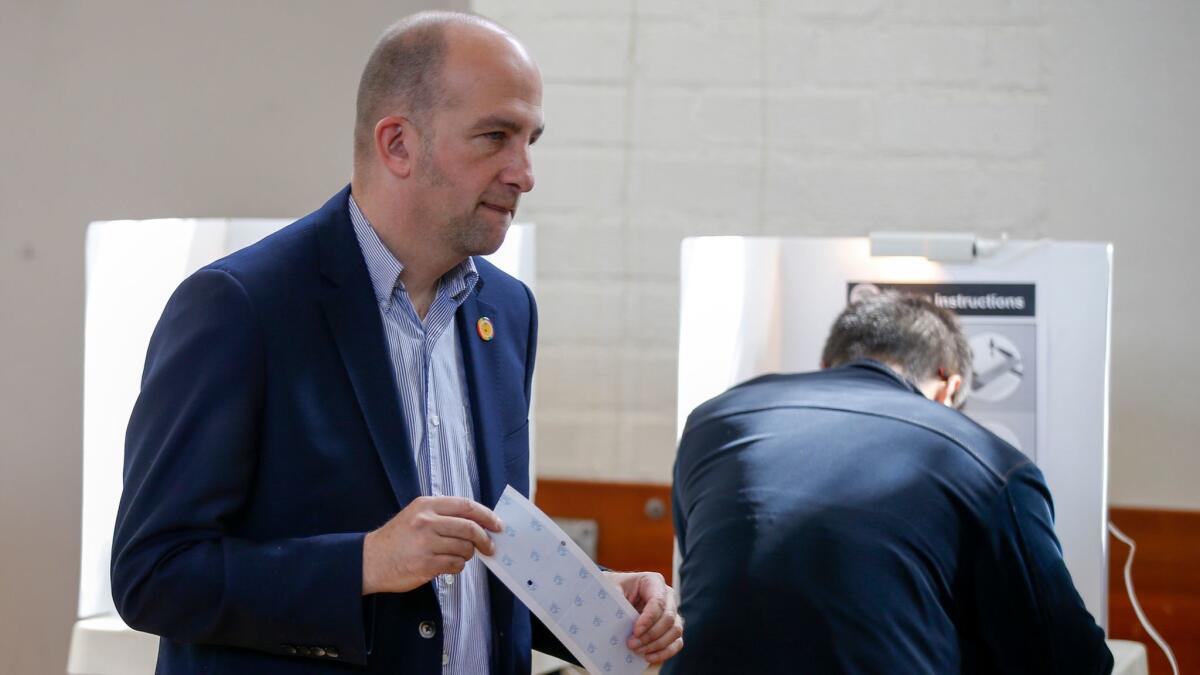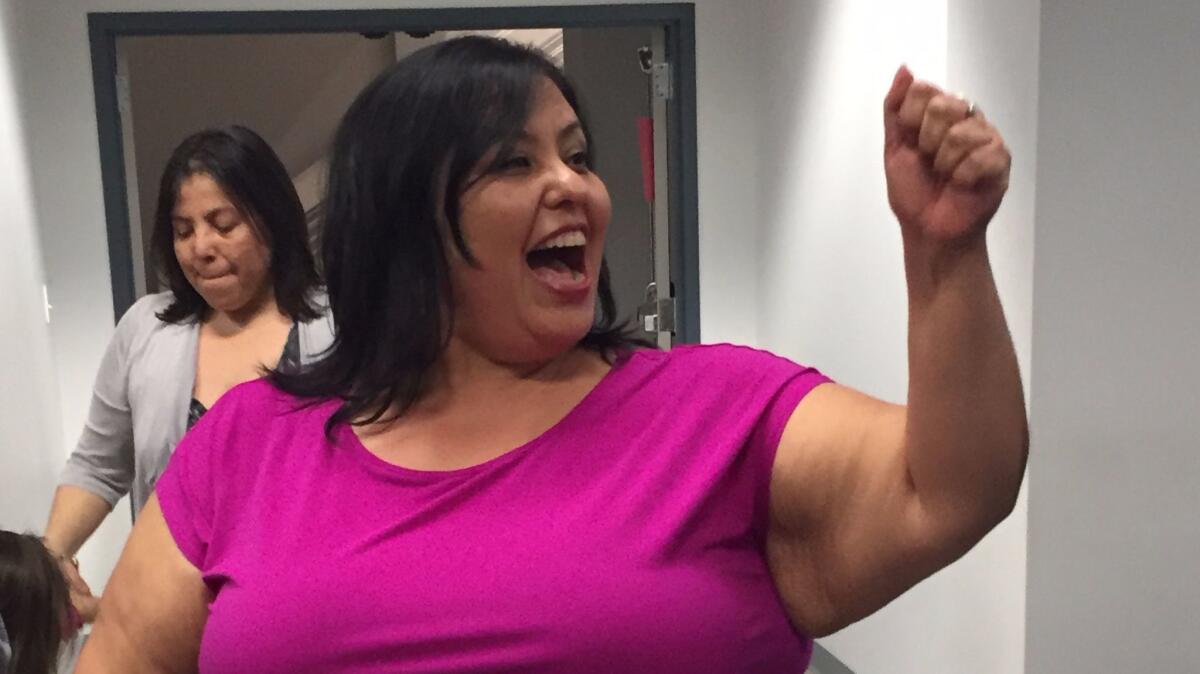Two pivotal L.A. school board contests go to May runoff; Garcia wins outright

- Share via
Charter school backers had their first chance on Tuesday to win majority control of the Los Angeles Board of Education, but now that goal has been deferred, if it happens at all.
In the highest-profile contest, in District 4, charter partisans were unable, for now, to unseat two-term incumbent and board President Steve Zimmer, who finished on top with 47% of the vote, according to unofficial final returns.
Because he did not win a majority, Zimmer still will face a May runoff against second-place finisher Nick Melvoin, who had 31% of the vote in a field of four.
Also in a runoff is charter-backed Kelly Gonez, who finished in front of a field of six, with 36% of the vote, in District 6. She’ll face Imelda Padilla, who, like Zimmer, was financially supported by the teachers union, United Teachers Los Angeles.
But charter backers did have one victory to celebrate. Incumbent Monica Garcia, an ally, cruised to victory in District 2, with 58% of vote.
Tuesday’s races marked the latest battle between supporters of charter schools and those allied with the teachers union. Those two factions spent millions of dollars on outside campaigns that dominated the election.
Looking ahead to the runoff, Zimmer said he hoped that voters understood what’s at stake.
“Voters have a stark choice,” he said, “between whether we can make more dreams come true for kids through working together with our teachers and parents or whether we’re going to return to the politics of conflict, competition and confrontation.”

Melvoin said a win for his side would represent new thinking and opportunity.
“I want to change the paradigm of the school district from a bureaucratic school system to an innovative ecosystem of public schools,” Melvoin said. “The district hasn’t adapted to a reality of innovation. They see it as a threat, but it doesn’t have to be.”
The noise of the campaigns often obscured the competing visions of reform. Zimmer and his allies described a school system making progress, which would benefit from stability while expanding successful programs, graduating more students and enhancing social services to families.
Charter allies backing Melvoin — and also Allison Holdorff Polhill, who finished third in District 4 — included civic leaders who want a major shake-up, which starts but doesn’t end with charter schools.
The last time this faction was in power, from 2011 to 2014 under then-Supt. John Deasy, it pushed to close or restaff low-performing, district-operated schools, end seniority protections for teachers and make standardized test scores a substantial part of teacher evaluations.
The district’s subsequent leadership, including Supt. Michelle King, moved away from Deasy’s priorities.
Charter advocates hoped to emerge with three victors who could form a four-vote majority with board member and charter school founder Ref Rodriguez. That milestone gain remains possible, pending the outcome of balloting in May.
Charters are privately managed public schools that are exempt from some rules that govern traditional campuses. Most are nonunion. L.A. has more charters than any other school system does; charter students make up about 16% of enrollment.
As election day began, charter backers liked their chances because they had endorsed competitive candidates and could count on seemingly unlimited financial resources from wealthy donors and support from the growing number of charter families.
But a major unknown was whether this core would turn out in greater numbers than supporters of the teachers union
Also unknown was the impact of a fiercely negative campaign in District 4, which covers the Westside and portions of the west San Fernando Valley. The union and its supporters tried to make voters see Melvoin and Holdorff Polhill as puppets of President Trump and U.S. Secretary of Education Betsy DeVos, who favor government support for many kinds of school choice, including charters and religious schools. Charter school advocates blamed Zimmer for an array of the school district’s past and current ills.

Garcia won charter backers’ support, despite the fact that she has been making decisions on the board longer than Zimmer has.
Garcia, who surged ahead of two challengers Tuesday, has a sturdy political base in a district that covers downtown and adjacent neighborhoods. And she faced no challenge from a perennial foe, the teachers union, which conserved its resources for the other contests.
Garcia said her goals as a board member — a 100% graduation rate and all students qualified to enter college — have resonated with the striving, low-income community she represents and grew up in.
“I think our movement gets stronger each election,” she said during a gathering at Puente Learning Center in Boyle Heights, which featured a mariachi band from Mendez High School and an arch of blue, white and gold balloons. “There are a lot of folks who want to see an LAUSD that serves more kids well.”
In that contest, longtime Eastside teacher Lisa Alva came in second with 32% and parent activist Carl J. Petersen was third with 10%.
“Either way, I win,” Alva said early Tuesday evening. “If I win, I win. If I don’t win the election, I get to go back to the classroom.”
District 6, in the east San Fernando Valley, came down to a face-off, at least in financial resources, between Gonez, a charter school science teacher, and Padilla, a community organizer.
Charter school backers, hoping for an outright win, ran a positive campaign for Gonez, along with negative campaigns targeting Padilla and Patty Lopez, a former state Assembly member who also was on the ballot. Lopez finished third with 13% of the vote.
Provisional ballots have yet to be counted, so the final percentages for each candidate could move up or down, but the outcomes are unlikely to change given the margins between candidates.
Those who win seats on the board face serious challenges. State laws are friendly to charter growth, so their numbers are expected to grow. When they siphon off more students, L.A. Unified loses funding based on enrollment, threatening its financial stability. A pro-charter board still would have to balance the district budget.
“It’s one thing to be a reformer on the outside, but I don’t think any of them would want to be on the board when the system collapses and they would be responsible,” said Pedro Noguera, a professor at UCLA’s Graduate School of Education and Information Sciences. “They will have to be much more creative than simply authorizing more charter schools.”
Times staff writers Joy Resmovits, Sonali Kohli and Anna M. Phillips contributed to this report.
UPDATES:
8:50 a.m., March 8: This article was updated with final unofficial results, including vote percentages for the leading candidates, and comments from candidates Monica Garcia and Lisa Alva.
10:45 p.m.: This article was updated with comments from candidate Nick Melvoin.
9:15 p.m.: This article was updated with candidates’ comments.
This article was originally published at 8:30 p.m., March 7.
More to Read
Sign up for Essential California
The most important California stories and recommendations in your inbox every morning.
You may occasionally receive promotional content from the Los Angeles Times.











